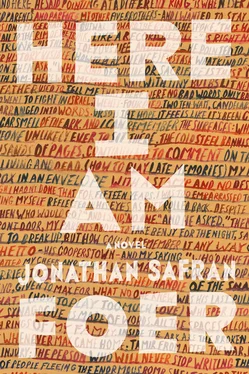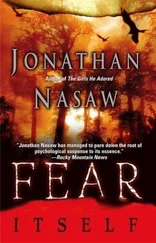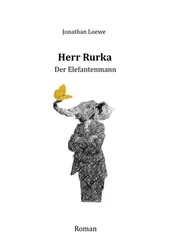“Dylan.”
“Of course.”
“Dylan is having a hard time.”
“Oh no. I’m sorry to hear that.”
“Maybe,” she began, but then shook the thought away.
“What?”
“I was just going to say, maybe if it’s not too much to ask, you could come by sometime.”
“I’m sure Sam would like that.”
“No,” she said, a vein in her neck suddenly visible, or suddenly noticed. “You. I meant you.”
Jacob no longer understood. Could she be as brazen as she sounded? Or was she mistaking him for a parent who was a child psychologist, as he’d mistaken her for the wife of an aneurysm victim? He was attracted to her, he wanted her, but this couldn’t go any further.
“Sure,” he said. “I could come by.”
“Maybe if you shared some of your experiences, it would make things less abstract for him. Less scary. I think part of what’s so hard right now is not having any details.”
“That makes sense.”
Although it didn’t.
“It wouldn’t have to take a lot of your time. I’m not asking you to take him on or anything.”
“It doesn’t sound like it.”
“You’re a good man,” she said.
“I’m not,” he said.
And then, finally, she laughed. “Well, I suppose only you know for sure. But you seem good.”
Once, Benjy called Jacob back into his room after tuck-in and asked, “Are there things that don’t have names?”
“Sure,” Jacob said, “lots of things.”
“Like what?”
“Like this headboard.”
“It’s called headboard.”
“Headboard is what it is. But it doesn’t have its own name.”
“True.”
“Good night, love.”
“Let’s give them names.”
“That was the first man’s first job, you know.”
“Huh?”
“Adam. From Adam and Eve. God told him to name the animals.”
“We named Argus.”
“That’s right.”
“But the first man was a monkey, right? So did he name himself?”
“Could be.”
“I want to name everything.”
“That would be a lot of work.”
“So?”
“OK. But starting tomorrow.”
“OK.”
Jacob went to the threshold and waited, as he always did, and Benjy called him back, as he always did.
“Yes?”
“Are there names that don’t have things?”
Names like the names on the gravestones in the suicide ghetto. Names like the names on the memorial wall, which Jacob had rearranged into words. Names like the names in his never-to-be-shared show. Jacob had written thousands and thousands of pages about his life, but it wasn’t until that moment, her pulse visible in her neck, his choice finally visible, that he questioned if he was worthy of a word.
“OK,” she said, and smiled, and nodded, and took a half step away. “Please say hello to Julia for me.”
“I will,” Jacob said.
He left the overflowing cartful of things where it was, followed the arrows back through LIVING ROOM, WORK SPACE, KITCHEN, DINING, and BEDROOM to the parking lot. He drove straight to the synagogue. Indeed, the lists were still there. But his name wasn’t among those who had gone. He double- and triple-checked.
So what had just happened?
Had she misremembered?
Or maybe she had seen the Islip photograph in the newspaper and was remembering his image when she thought she was remembering his name?
Maybe she was giving Jacob the benefit of the doubt?
Maybe she knew everything and was destroying the life he’d saved?
With the hand that had cut three umbilical cords, he touched the names of the dead.
“Only you know for sure,” she had said.
* * *
There were dozens of veterinarians far closer than Gaithersburg, Maryland, that he hadn’t consulted — it felt essential to go to someone they hadn’t seen, for both Argus’s sake and Jacob’s — but he needed to create some distance from home.
On the way there, he took Argus to a rest-stop McDonald’s. He brought the food to a grassy hill beside the lot, and tried to feed Argus McNuggets, but Argus just turned away. Jacob kept stroking him under the chin, as he liked.
Life is precious , Jacob thought. It is the most important of all thoughts, and the most obvious, and the most difficult to remember to have. He thought: How different my life would have been if I could have had that thought before I was forced to.
They drove with the windows halfway down, Dan Carlin’s “Hardcore History: Blueprint for Armageddon II” blaring. In the context of an argument Carlin was making about the significance of World War I, he spoke about a concept called the Great Filter — the moment at which a civilization becomes capable of destroying itself. Many mark 1945, and the use of nuclear weapons, as humanity’s Great Filter. Carlin argued it was 1914, with the worldwide proliferation of mechanized warfare. He then digressed a bit, as was his genius, to Fermi’s paradox. During a lunch break at Los Alamos, in 1950, a handful of the world’s greatest physicists were joking about a recent spate of UFO sightings. Taking the matter ironically-seriously, they unfolded a paper napkin and tried to calculate the probability of intelligent life existing elsewhere. Assume there are 1024 stars in the observable universe — ten thousand stars for every grain of sand on Earth. Using the most conservative estimates, there are approximately one hundred billion billion Earth-like planets — one hundred for each grain of sand on Earth. If, after billions of years in existence, one percent of those developed life, and one percent of those developed intelligent life, there should be ten million billion intelligent civilizations in the universe — one hundred thousand just in our galaxy. Clearly we are not alone.
But then Enrico Fermi, the most celebrated and brilliant physicist at the table, spoke for the first time: “So where is everybody?” If they ought to be there, and they aren’t there, why aren’t they there? Clearly we are alone.
There are many responses to this paradox: that there’s plenty of intelligent life in the universe, just no way of knowing about it because we’re too far from one another for any messages to reach; that humans aren’t listening properly; that other life is too alien to recognize, or to recognize us; that everyone is listening and no one adequately transmitting. Each of these struck Jacob as unbearably poetic: we’re too far for messages to reach; we aren’t listening properly; no one is adequately transmitting. Then Carlin returned to the notion of the Great Filter. At a certain point, every civilization will become capable of destroying itself (on purpose, or by accident), and face a kind of pass/fail test — whether it is possible to have the ability to commit suicide, and not commit suicide.
When did Isaac reach his Great Filter?
When did Israel?
When did Jacob and Julia’s marriage?
When did Jacob?
He parked the car and walked Argus to the clinic door. No leash necessary anymore. Argus wasn’t going anywhere. And yet Jacob wished he’d had a leash then, so it wouldn’t feel like Argus was unknowingly walking himself to his own end. It would have been horrible to lead him there, but less horrible.
The place was called Hope Clinic. Somehow Jacob had forgotten that, or never bothered to know it. It reminded him of a Kafka quote: “Oh, there is hope, an infinite amount of hope, just not for us.” Just not for you, Argus.
They went to the reception desk.
“This is a checkup?” the secretary asked.
“Yes,” Jacob responded.
He just couldn’t. He wasn’t ready. He’d have another chance with the vet.
Jacob browsed a magazine without focusing his eyes. He remembered the first time one of his kids called him out for looking at his phone instead of at them.
Читать дальше












